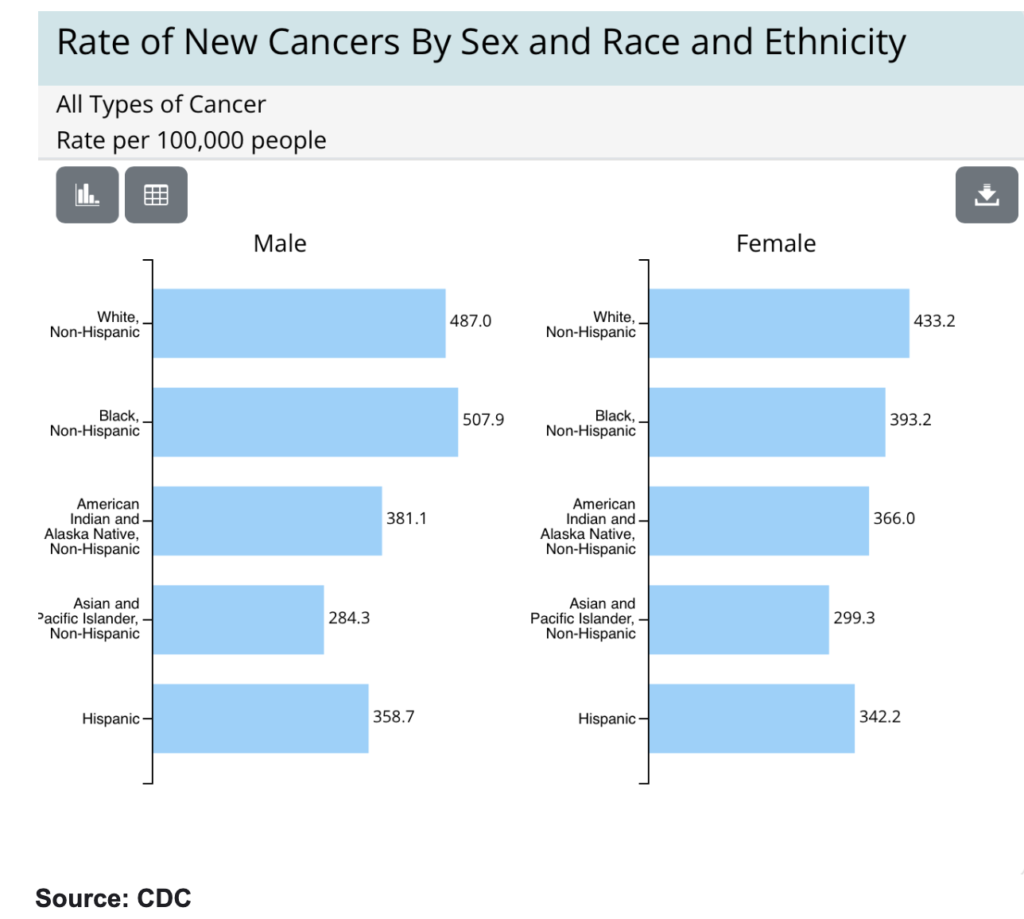cancer
1 in 3 are diagnosed
Knowing your risk factors, adopting healthy habits and getting screened can help empower your health journey.
Cancer
1 IN 3 ARE DIAGNOSED
Knowing your risk factors, adopting healthy habits and getting screened can help empower your health journey.
What is Cancer?
- Cancer is a disease caused by the uncontrolled division of abnormal cells in the body.
- Cancer cells can invade other parts of the body through the blood and lymph systems.
- Cancer affects 1 in 3 people in the United States.
- Chances are that you or someone you know has been affected by cancer.
- In the United States in 2019, 1,752,735 new cancer cases were reported and 599,589 people died of cancer.
symptoms
- Unexpected weight loss, night sweats, or fever
- Indigestion or difficulty swallowing
- Severe headaches
- Obvious change in a wart or a mole
- Persistent lumps or swollen glands
- Blood in the urine
- Hoarseness
- Breast lump or breast discharge
- Non-healing sores
- Persistent itching in the anal or genital area
- Vaginal bleeding or discharge that is unusual
- Blood in the stool
Risk Factors
- Aging is the most important risk factor for cancer in general. The median age for the diagnosis of cancer is 66.
- Drinking alcohol can increase your risk of mouth, throat, esophagus, liver, and breast cancer.
- Tobacco causes many types of cancer and is a leading cause of (and death from) cancer.
- Poor diet, many nutrients, additives, and other dietary components have been associated with increased risk of cancer.
- Hormones can affect your weight, your body temperature and your cancer risk.
- Chronic inflammation can cause DNA damage and lead to cancer.
- Immunosuppressive drugs make the immune system less able to fight cancer cells.
- Genetics. If a family member had a certain cancer this my increase your risk.
- Exposure to infectious agents.
- Being overweight can increase risk.
- Excessive exposure to sunlight or radiation.
Ways to Prevent
- Exercise regularly.
- Eat a healthy diet.
- Get to a healthy weight and stay there.
- Avoid tobacco.
- Limit alcohol.
- Get cancer screening tests regularly.

common types of cancer
Carcinoma– a type of cancer that begins in skin tissue or in tissues that line (or cover) internal organs.
Sarcoma- a type of cancer that begins in connective or supportive tissue such as: muscle, bone, cartilage, fat, or blood vessels.
Leukemia– a type of cancer that starts in blood-forming tissue (bone marrow) and produces large numbers of abnormal blood cells that enter the blood.
Lymphoma and multiple myeloma– these cancers begin in cells of the immune system.
Central Nervous System Cancers– these cancers begin in the tissues of the brain and spinal cord.
screening/detection
- Get regular cancer screening tests:
- Everyone 50 years or older should be screened for colorectal cancer every 5-10 years
- Men should be screened for prostate cancer every 1-2 years
- Women should receive a pap smear (cervical cancer) every 3 years and those over 50 should receive a mammogram (breast cancer) every 2 years
What to do if you are at risk?
Contact your primary care physician if you are feeling symptoms. They may refer you to a specialist for screening.
You may be referred to an Oncologist, a doctor that specializes in treating cancer
STATISTICS FOR PEOPLE OF COLOR
- For most cancers, African Americans have the highest death rate and shortest survival rate of any racial and ethnic group in the US.
- Black men are 1.7 times more likely to be diagnosed with—and 2.1 times more likely to die from—prostate cancer than white men.
- Lung cancer kills more African Americans men than any other cancer. Breast cancer kills more African American women than any other cancer.
- African American men are 1.8 times as likely to have a new case of stomach cancer when compared to white men.
- About 224,080 new cancer cases and 73,680 cancer deaths are expected to occur among Black people in 2022.
- Black people have the highest death rate and shortest survival of any racial/ethnic group in the United States for most cancers. For example, Black women are 41% more likely to die from breast cancer than White women, despite lower incidence of the disease.

Links, Tools, Resources
Grand Rapids/Kent County/Michigan Resources
https://msutoday.msu.edu/news/2022/msu-brings-better-cancer-diagnosis-and-treatment-home-to-michigan
https://vitalstats.michigan.gov/osr/Cancer/Race/Kent_Num.asp
Latest Advances, Clinical Trials & Breakthroughs in Cancer
https://www.cancer.gov/news-events/nca50/stories/technologies-and-innovations
https://www.cancer.gov/news-events/cancer-currents-blog
https://www.cnn.com/2022/12/13/health/mrna-cancer-vaccine-study/index.html
